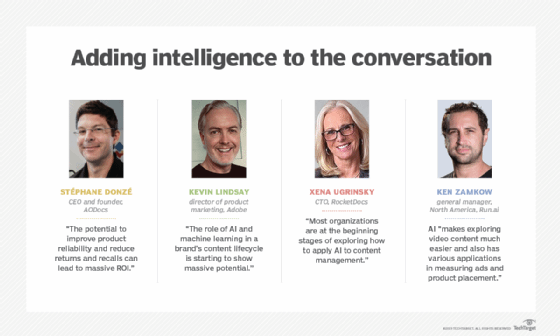
AI CMS workflows create up close and personal experiences
Incorporating AI into the basic building blocks of CMS workflows optimizes content creation and preparation to personalize interactions with customers over multiple channels.
Content management system workflows come in many shapes and sizes. Regardless, AI can upgrade those CMS workflows to optimize content creation, streamline content preparation processes and ultimately improve customer experiences in multiple channels.
More specifically, AI can be used to automatically label content, break content into smaller groups and build more sophisticated indexes for content. These basic building blocks can be woven together to support different CMS workflows.
"The role of AI and machine learning in a brand's content lifecycle is starting to show massive potential," said Kevin Lindsay, director of product marketing at Adobe.
Beyond document management, "[m]ost organizations are at the beginning stages of exploring how to apply AI to content management," added Xena Ugrinsky, CTO of response orchestration platform maker RocketDocs. Applications that show consistent results include massive compute, natural language processing (NLP) and visual image processing.
Personalizing customer experiences
Marketers have long sought to deliver a completely unique experience for each visitor to their company's website, but personalizing the content remains an obstacle, Lindsay noted. AI and machine learning can help personalize content and control how experiences take place -- for example, tailoring page layouts based on a visitor's behavior patterns and buying habits or optimizing content according to a customer's device and channel. "Achieving this at scale would be nearly impossible without AI," Lindsay noted.
AI can help create bite-sized nuggets of personalized content at the optimal time through any platform -- a game-changer for how content is clipped, presented and created today, said Benjamin Howell, director of product management at Veritone, makers of an AI-based asset management system.

A CMS application could, for example, ingest real-time sports, news, talk shows and radio programs. AI processing would use third-party structured data to programmatically identify specific moments and create clips. A moment could be a single play in a football game, a golf shot or news program segment. That would remove a lot of manual actions required to search and discover content and ultimately clip the content. Many moving parts are needed to put this capability into practice, including content ingestion, the engine types needed to process content, the content to be clipped, third-party structured data and preference models for clipping, Howell explained.
CMS workflows are often used to organize data for salespeople when they interact with customers. AI could help select the appropriate data for a salesperson working on a specific proposal, Ugrinsky said. AI might identify specific product benefits that could be included in a sales proposal or compare the characteristics of successful and unsuccessful proposals.
Building smarts into CMS workflows
AI can be a critical component in making content management more intelligent and efficient, said Dietmar Rietsch, CEO of product information management platform Pimcore. Dr. Oetker, a German multinational food company, created a recipe database on top of the Pimcore platform that uses AI and NLP to automatically relate the right product to a recipe. NLP is also used to convert texts, grammar and units to make recipes for different numbers of users.
AI helps people decrease the amount of time spent on writing and editing content -- among the more time-consuming phases of CMS workflows, said May Habib, CEO and co-founder of Qordoba, a deep learning content style checker. When editorial content needs to follow strict standards, AI can ensure that every individual and department in an organization writes and produces consistent content. A new generation of style checkers can compare new content to existing content and provide feedback to writers.
Media and telecommunications companies use AI techniques to create better indexes of video content, said Ken Zamkow, general manager, North America, at deep learning training platform maker Run.ai. Deep learning, computer vision, facial recognition, object detection and NLP models automatically generate granular indexes on video content.
"This makes exploring video content much easier and also has various applications in measuring ads and product placement," Zamkow added. These applications require a combination of deep learning models trained on recognizing actors' faces, objects and spoken names to provide a clear description of the video's contents.
CMS workflows can help organize descriptions, photos and prices for a company's products. Organizing this content for the website can involve brands, retailers and third-party services, which can sometimes incorrectly tag pictures or descriptions, said Allan Kronfeld, COO at 24ttl, an e-commerce consultancy and digital products provider. Manually verifying each product can be a challenge. Online monitoring tools like 24orm use AI to verify correct content by comparing images and descriptions to the originals. The system then notifies the brand so it can make the necessary adjustments with the retailer.
AI can analyze, classify and combine content to uncover hidden information, such as unexpected similarities, patterns and correlations, said Stéphane Donzé, CEO and founder of cloud document management platform AODocs. "The potential to improve product reliability and reduce returns and recalls can lead to massive ROI," Donzé said. A car equipment manufacturer, for example, could detect a link among certain types of issues or weather, then use this information to prevent product malfunctions. Building these kinds of apps is much easier today using packaged AI modules that reduce the need for highly trained mathematicians and analysts to uncover hidden information.








